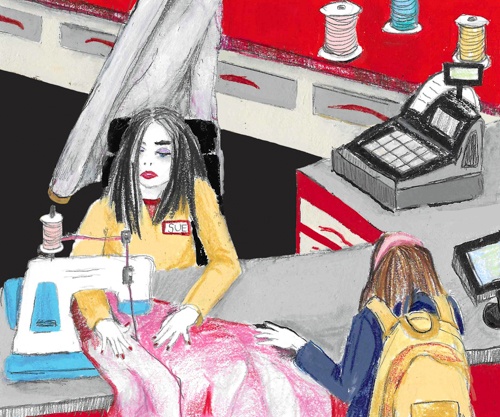 Illustration by Madeline McMahon.
Illustration by Madeline McMahon.
Fruits of the Loom
Writing from Quebec. Translated by Melissa Bull.
When I was young, all the women I knew in Trois-Rivières lived below the poverty line. They went to work at the Fruit of the Loom factory in the morning, where they sewed, spun, spent themselves as fast as they could. At the end of each day, they exited the factory a little more worn, with something missing, something the factory had taken from them, something they seemed to search for each night before the television but only found in the morning, once the night had passed.
Every day, they sewed. Every day, they were asked to accelerate the cadence of their work, and the clothes sped ever faster beneath their hands. Their lives were stitched together in this way, caught in repetitive motions they didn’t have the time to watch go by. Like the T-shirt pieces that arrived each morning in boxes of twelve, which they traded one another to assemble. They tried to seam their piecemeal lives together, but they never saw the whole picture, the end of the chain. For the women of my childhood, life was always something to begin again.
Before going to Fruit of the Loom, many women had dreamed of being secretaries, nurses or models. They went into the factory at the end of their adolescence because they were told that that was where their future lay. They were told they didn’t need schooling, that the factories were immortal, that they’d continue to exist as long as there was cotton and women enough to furnish them. But, one by one, the enormous chimneys eventually went cold. And all that was left of the city was a cemetery of buildings and empty bank accounts.
On May 4, 2001, when it was announced that the Fruit of the Loom factory was closing, the women of my childhood left the factory, feeling for the first time that the factory had left them. I saw their reddened eyes searching for a spot to land. Their future had dissolved beneath the touch of their fingers, and it was as if they were suddenly aware that they had grown old, and that no boss would hire them ever again.
The factory had betrayed them. The future had betrayed them. They didn’t have a thread to hang from, or anything to string them along but their welfare cheques. They were told free trade was good for them, that it would translate to more economic growth, that they would be the first to profit from it. They were told that the factory closures were the price they had to pay to arrive at the future—the real future, the one that would finally crack open before them. But in the time that followed, Trois-Rivières became Canada’s welfare capital. One person out of five who was looking for work was told it was the dawn of a new millennium, that times had changed, that their two or three decades of factory experience were worthless in the job market. They would have to go back to school.
I watched as, in their late forties, the women of my childhood returned to high school to finish their diplomas. It was as if, after all these years, they were seeking their lives from before the factories, as if the openness of their future had the power to bring them back to that precise point in their past—as if everything had been erased. They were seventeen again, and the possibility of becoming a secretary, nurse or model was once more foreseeable. They left for school with their backpacks and their lunch boxes at the same time as me in the mornings. They travelled to school by car; I by foot. And yet the future would allow me to arrive before them.
I saw them learn, adeptly and poorly, to use computers, paid for with money scavenged from their grocery budgets, or thanks to a program to “connect families” implemented by the same government that had disconnected the factories. I was young, but I still saw them. I saw their fear, and I also saw their hope that they might finally be moving forward, towards a future that grew ever more beautiful and illusory with time. Every evening, I saw them return home from school laden with grocery bags, I saw them make dinner, clean the house, put their children to bed, prepare the next day’s lunches, and stay awake late into the night, heads bent over their notebooks as they relearned their times tables and how to “write sensibly.”
I saw their efforts. I saw their distress. I saw their pride when they received their diplomas and I also saw the French mistakes the teacher pretended not to catch on their final exams. I helped them note their very first diplomas on their very first résumés. I was there at convocation when it was announced that the future, at last, belonged to them. The factories had stopped running but they had survived. I saw them ready to enter into the new millennium with their heads held high. Then I saw them collide with Emploi-Québec’s perpetually empty job boards. I saw them relegated, again, to the bottom of the ladder, to the bottom of their dreams. I saw them realize that the future was nothing more than the eternal repetition of the present.
Excerpted from “Femmes Invisibles” (part I), published by Liberté (no. 317). Part II appeared in Liberté no. 318. Reprinted with permission from the author.





